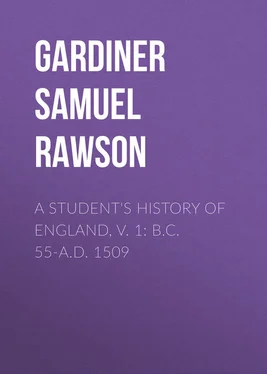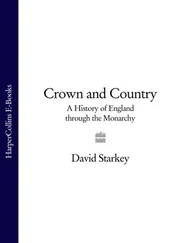Samuel Gardiner - A Student's History of England, v. 1 - B.C. 55-A.D. 1509
Здесь есть возможность читать онлайн «Samuel Gardiner - A Student's History of England, v. 1 - B.C. 55-A.D. 1509» — ознакомительный отрывок электронной книги совершенно бесплатно, а после прочтения отрывка купить полную версию. В некоторых случаях можно слушать аудио, скачать через торрент в формате fb2 и присутствует краткое содержание. Издательство: Иностранный паблик, Жанр: foreign_prose, История, foreign_antique, на английском языке. Описание произведения, (предисловие) а так же отзывы посетителей доступны на портале библиотеки ЛибКат.
- Название:A Student's History of England, v. 1: B.C. 55-A.D. 1509
- Автор:
- Издательство:Иностранный паблик
- Жанр:
- Год:неизвестен
- ISBN:нет данных
- Рейтинг книги:5 / 5. Голосов: 1
-
Избранное:Добавить в избранное
- Отзывы:
-
Ваша оценка:
- 100
- 1
- 2
- 3
- 4
- 5
A Student's History of England, v. 1: B.C. 55-A.D. 1509: краткое содержание, описание и аннотация
Предлагаем к чтению аннотацию, описание, краткое содержание или предисловие (зависит от того, что написал сам автор книги «A Student's History of England, v. 1: B.C. 55-A.D. 1509»). Если вы не нашли необходимую информацию о книге — напишите в комментариях, мы постараемся отыскать её.
A Student's History of England, v. 1: B.C. 55-A.D. 1509 — читать онлайн ознакомительный отрывок
Ниже представлен текст книги, разбитый по страницам. Система сохранения места последней прочитанной страницы, позволяет с удобством читать онлайн бесплатно книгу «A Student's History of England, v. 1: B.C. 55-A.D. 1509», без необходимости каждый раз заново искать на чём Вы остановились. Поставьте закладку, и сможете в любой момент перейти на страницу, на которой закончили чтение.
Интервал:
Закладка:
4. Growth of the King's Power.—In the early days of the English conquest the kings and other great men had around them their war-bands, composed of gesiths or thegns, personally attached to themselves, and ready, if need were, to die on their lord's behalf. Very early these thegns were rewarded by grants of land on condition of continuing military service. Every extension of the king's power over fresh territory made their services more important. It had always been difficult to bring together the fyrd, or general army of the freemen, even of a small district, and it was quite impossible to bring together the fyrd of a kingdom reaching from the Channel to the Firth of Forth. Ælfred's division of the fyrd into two parts, one to fight and the other to stay at home, may have served when all the fighting had to be done in the western part of Wessex. Æthelstan or Eadmund could not possibly make even half of the men of Devonshire or Essex fight in his battles north of the Humber. The kings therefore had to rely more and more upon their thegns, who in turn had thegns of their own whom they could bring with them; and thus was formed an army ready for military service in any part of the kingdom. A king who could command such an army was even more powerful than one who could command the whole of the forces of a smaller territory.
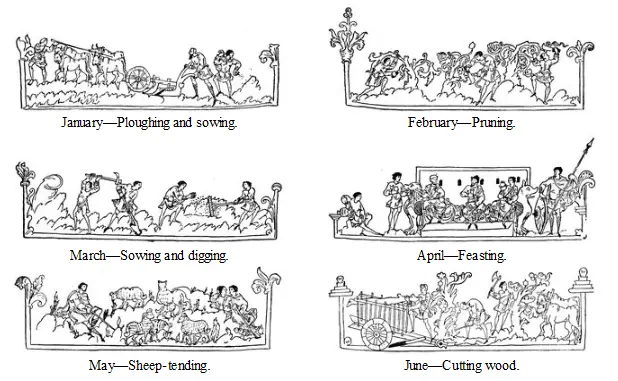
Rural life in the eleventh century. January to June.
(Cott. MS. Julius A. vi.)
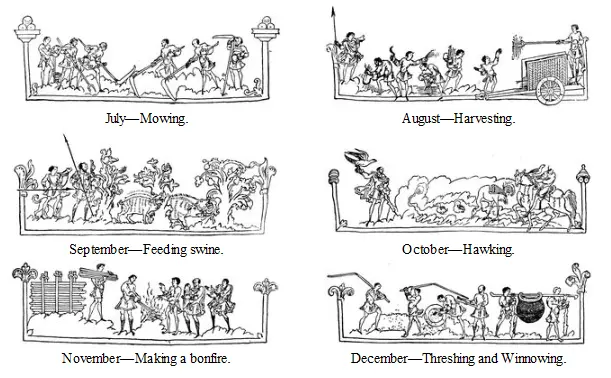
Rural life in the eleventh century. July to December.
(Cott. MS. Julius A. vi.)]
5. Conversion of the Freemen into Serfs.—It is impossible to give a certain account of the changes which passed over the English freemen, but there can be little doubt that a process had been for some time going on which converted them into bondmen, and that this process was greatly accelerated by the Danish wars. When a district was being plundered the peasant holders of the strips of village land suffered most, and needed the protection of the neighbouring thegn, who was better skilled in war than themselves, and this protection they could only obtain on condition of becoming bondmen themselves—that is to say, of giving certain days in the week to work on the special estate of the lord. A bondman differed both from a slave and from a modern farmer. Though he was bound to the soil and could not go away if he wished to do so, yet he could not be sold as though he were a slave; nor, on the other hand, could he, like a farmer, be turned out of his holding so long as he fulfilled his obligation of cultivating his lord's demesne. The lord was almost invariably a thegn, either of the king or of some superior thegn, and there thus arose in England, as there arose about the same time on the Continent, a chain of personal relationships. The king was no longer merely the head of the whole people. He was the personal lord of his own thegns, and they again were the lords of other thegns. The serfs cultivated their lands, and thereby set them free to fight for the king on behalf of the whole nation. It seems at first sight as if the English people had fallen into a worse condition. An organisation, partly military and partly servile, was substituted for an organisation of free men. Yet only in this way could the whole of England be amalgamated. The nation gained in unity what it lost in freedom.
6. The Hundred-moot and the Lord's Court.—In another way the condition of the peasants was altered for the worse by the growth of the king's power. In former days land was held as 'folkland,' granted by the people at the original conquest, passing to the kinsmen of the holder if he died without children. Afterwards the clergy introduced a system by which the owner could grant the 'bookland,' held by book or charter, setting at nought the claim of his kinsmen, and in order to give validity to the arrangement, obtained the consent of the king and his Witenagemot (see p. 45). In time, the king and the Witenagemot granted charters in other cases, and the new 'bookland' to a great extent superseded the old 'folkland,' accompanied by a grant of the right of holding special courts. In this manner the old hundred-moots became neglected, people seeking for justice in the courts of the lords. Yet those who lived on the lord's land attended his court, appeared as compurgators, and directed the ordeal just as they had once done in the hundred-moot.
7. The Towns.—The towns had grown up in various ways. Some were of old Roman foundation, such as Lincoln and Gloucester. Others, like Nottingham and Bristol, had come into existence since the English settlement. Others again gathered round monasteries, like Bury St. Edmunds and Peterborough. The inhabitants met to consult about their own affairs, sometimes in dependence on a lord. Where there was no lord they held a court which was composed in the same way as the hundred-moots outside. The townsmen had the right of holding a market. Every sale had to take place in the presence of witnesses who could prove, if called upon to do so, that the sale had really taken place, and markets were therefore usually to be found in towns, because it was there that witnesses could most easily be found.
8. The Origin of the Shires.—Shires, which were divisions larger than the hundreds, and smaller than the larger kingdoms, originated in various ways. In the south, and on the east coast as far north as the Wash, they were either old kingdoms like Kent and Essex, or settlements forming part of old kingdoms, as Norfolk (the north folk) formed part of East Anglia, and Dorset or Somerset, the lands of the Dorsætan or the Somersætan, formed part of the kingdom of Wessex. In the centre and north they were of more recent origin, and were probably formed as those parts of England were gradually reconquered from the Danes. The fact that most of these shires are named from towns—as Derbyshire from Derby, and Warwickshire from Warwick—shows that they came into existence after towns had become of importance.
9. The Shire-moot.—Whilst the hundred-moot decayed, the folk-moot continued to flourish under a new name, as the shire-moot. This moot was still attended by the freemen of the shire though the thegns were more numerous and the simple freemen less numerous than they had once been. Still the continued existence of the shire-moot kept up the custom of self-government more than anything else in England. The ordeals were witnessed, the weregild inflicted, and rights to land adjudged, not by an officer of the king, but by the landowners of the shire assembled for the purpose. These meetings were ordinarily presided over by the ealdorman, who appeared as the military commander and the official head of the shire, and by the bishop, who represented the Church. Another most important personage was the sheriff, or shire-reeve, whose business it was to see that the king had all his rights, to preside over the shire-moot when it sat as a judicial court, and to take care that its sentences were put in execution.
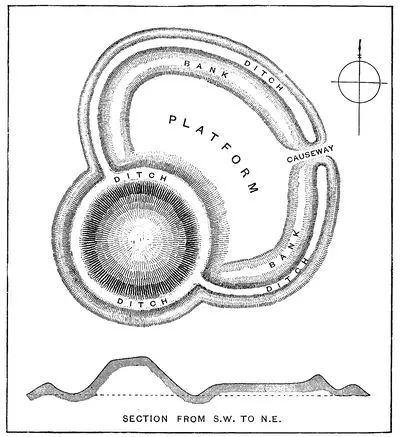
Walker & Boutallse.
Plan and section of a burh of the eleventh century at Laughton-en-Le-Morthen, Yorks.
10. The Ealdormen and the Witenagemot.—During the long fight with the Danes commanders were needed who could lead the forces of more than a single shire. Before the end of Eadred's reign there were ealdormen who ruled over many shires. One of them for instance, Æthelstan, Ealdorman of East Anglia, and of the shires immediately to the west of East Anglia, was so powerful that he was popularly known as the Half-King. Such ealdormen had great influence in their own districts, and they also were very powerful about the king. The king could not perform any important act without the consent of the Witenagemot, which was made up of three classes—the Ealdormen, the Bishops, and the greater Thegns. When a king died the Witenagemot chose his successor out of the kingly family; its members appeared as witnesses whenever the king 'booked' land to any one; and it even, on rare occasions, deposed a king who was unfit for his post. In the days of a great warrior king like Eadward or Eadmund, members of the Witenagemot were but instruments in his hands, but if a weak king came upon the throne, each member usually took his own way and pursued his own interest rather than that of the king and kingdom.
Читать дальшеИнтервал:
Закладка:
Похожие книги на «A Student's History of England, v. 1: B.C. 55-A.D. 1509»
Представляем Вашему вниманию похожие книги на «A Student's History of England, v. 1: B.C. 55-A.D. 1509» списком для выбора. Мы отобрали схожую по названию и смыслу литературу в надежде предоставить читателям больше вариантов отыскать новые, интересные, ещё непрочитанные произведения.
Обсуждение, отзывы о книге «A Student's History of England, v. 1: B.C. 55-A.D. 1509» и просто собственные мнения читателей. Оставьте ваши комментарии, напишите, что Вы думаете о произведении, его смысле или главных героях. Укажите что конкретно понравилось, а что нет, и почему Вы так считаете.
